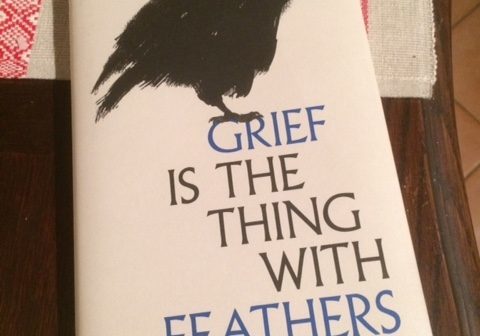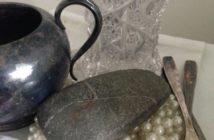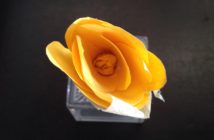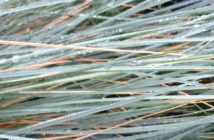One of the problems about being a book reviewer is whether or not to read reviews by other people. I try to read the book itself before I look at any of its reviews, so that the opinions I express are genuinely my own. Afterwards, I sometimes have a look on the Goodreads website to see how many good and bad reviews there are. But while this abstinence from reviews helps me formulate my own opinions, it doesn’t always help me to find new books that are worth a read.
Occasionally there will be lots of attention for a book on Twitter, and that is where I first saw this title a few months back. Recently covers for the American and French editions popped up too, giving me a sense of its growing popularity. So, when I saw a copy in Books a Plenty , it was an easy choice to make.
 It is very hard to categorise Grief is a thing with Feathers exactly. It is almost poetry, but then it isn’t quite. Some pages are prose, but many look suspiciously like verse. Don’t be put off by that, just read it for the words and the sentiments. The blurb on the cover has the same problem of categorisation, talking of “part novella, part polyphonic fable, part essay on grief”. Phrases like polyphonic fable are the sort of thing that put many people off, so just ignore that and read this for what it says.
It is very hard to categorise Grief is a thing with Feathers exactly. It is almost poetry, but then it isn’t quite. Some pages are prose, but many look suspiciously like verse. Don’t be put off by that, just read it for the words and the sentiments. The blurb on the cover has the same problem of categorisation, talking of “part novella, part polyphonic fable, part essay on grief”. Phrases like polyphonic fable are the sort of thing that put many people off, so just ignore that and read this for what it says.
Grief is a thing with Feathers is only a slim volume, just 114 pages, that might not take you more than a day to read. But it will certainly be worth it. The central theme is the death of a woman, a wife and a mother, narrated from three different perspectives; Dad, Boys and Crow. It is the Crow that comes to help father and sons navigate through their grief and they have many conversations together. It is a book of intense sadness at times and also great humour, with the occasional laugh out loud moment. The way it represents the grief and the loss is very profound and very moving.
The theme of the Crow is taken from the poet Ted Hughes. One of his books of poems is called Crow, and the Dad in this book studies the works of Hughes, trying to write about them. It is not necessary to know anything about Ted Hughes and his wife Sylvia Plath in order to be able to enjoy this book, it simply lends another aspect to the depth and complexity. Crow is certainly not an easy book of poetry.
I’m not sure exactly how old Max Porter is, but he is a young man who works for a publisher in London. What he has captured is a poignancy that is beyond his years, or perhaps one that speaks of a loss that he has known. This is his first book and his Crow is a wonderful creation; confrontational, plain speaking and something of a trickster, but also loyal and caring of the boys. Certainly he is wise.
There is one short paragraph which I find extraordinarily beautiful and so will risk untold copyright infringements to quote it to you in full. The Dad recalls the relationship with his wife.
“I remember being scared that something must, surely, go wrong, if we were this happy, her and me, in the early days, when our love was settling into the shape of our lives like cake mixture reaching the corners of the tin as it swells and bakes.”
It is poetic, descriptive and moving. It beautifully captures in a few short words the development of a relationship.
Perhaps if you enjoy this work, you may want to explore the poems of Ted Hughes. My advice would be to start with the collection called Birthday Letters and work backwards in time from there. Max Porter took this book only to the publisher Faber and Faber, who published all of Hughes’ poetry. He felt it had to be them or no-one. Apparently the editor rang him in tears, such is the power of Grief is a Thing with Feathers.
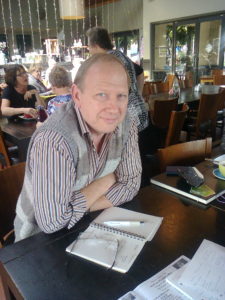 Marcus Hobson is the ARTbop Literary Editor, regular book reviewer, writer, and the Secretary of the Tauranga Writers group Marcus has been, and continues to be, lots of things. An aspiring author of both novels and reviews, he has always said he wants to be a writer and 40 years later is making that come true. He has in the past done such varied things as study ancient and mediaeval history at Uni in London, worked as an archaeologist, as an economist in central and southern Africa, and as truck driver in a quarry. About two years ago he relocated to the beautiful Bay from a finance job in Auckland. He is a lover of art, the written word and a full-time fanatical book collector, with over 3,000 volumes on his shelves. He lives close to Katikati with his wife and sometimes their three daughters, two cats, a library and the odd chicken. Marcus is currently working on a “factional” work about World War One.
Marcus Hobson is the ARTbop Literary Editor, regular book reviewer, writer, and the Secretary of the Tauranga Writers group Marcus has been, and continues to be, lots of things. An aspiring author of both novels and reviews, he has always said he wants to be a writer and 40 years later is making that come true. He has in the past done such varied things as study ancient and mediaeval history at Uni in London, worked as an archaeologist, as an economist in central and southern Africa, and as truck driver in a quarry. About two years ago he relocated to the beautiful Bay from a finance job in Auckland. He is a lover of art, the written word and a full-time fanatical book collector, with over 3,000 volumes on his shelves. He lives close to Katikati with his wife and sometimes their three daughters, two cats, a library and the odd chicken. Marcus is currently working on a “factional” work about World War One.
If you would like to contribute your original book reviews to ARTbop WORDS please forward them to info@artbop.co.nz for the attention of the Literary Editor Marcus Hobson. We prefer the work is emailed in docx format We appreciate one or two jpg images (not enormous ones as they become an uploading issue for ARTbop)


